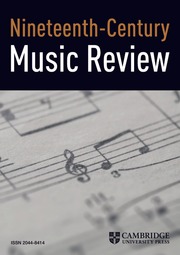No CrossRef data available.
Article contents
A New Source for Schubert’s Hebrew Psalm 92 (D. 953)
Published online by Cambridge University Press: 28 March 2016
Abstract
In the summer of 1828, Franz Schubert composed his one and only piece in Hebrew: an excerpt of Psalm 92, set for four-part choir and Solo Baritone. The main sources available until now for this composition, a manuscript in the Gesellschaft der Musikfreunde (A-Wgm Sammlung Witteczek-Spaun Bd. 31) and a printed version in Salomon Sulzer’s compendium of Viennese synagogal music, Schir Zion (Song of Zion), date to 1834/35 and 1839/40, respectively. A newly discovered manuscript, dating from 1832, represents an early stage in the compilation of Schir Zion and contains the earliest known source of Schubert’s piece. New variant readings with regard to pitch, ornamentation and text underlay suggest that Schubert’s lost autograph may not be the immediate parent of the best sources known until now. With its title in Hebrew calligraphy, moreover, this manuscript was clearly intended for Jewish use; it thus challenges the authority of Schir Zion with regard to the underlay of the Hebrew text. The manuscript demonstrates a starting point in the adaptation by later editors, including Salomon Sulzer’s son Joseph, of Schubert’s Hebrew composition from the living, essentially oral performance tradition of an expert cantor to the formal written requirements of publication for a far-flung audience.
- Type
- Research Article
- Information
- Copyright
- © Cambridge University Press 2016
References
1 Previous scholarly studies include Idelsohn, Abraham, Jewish Music in Its Historical Development (New York: Schocken, 1967): 246–260 Google Scholar; Brody, Elaine, ‘Schubert and Sulzer Revisited: A Recapitulation of the Events Leading to Schubert’s Setting in Hebrew of Psalm XCII, D 953’, in Schubert Studies: Problems of Style and Chronology, ed. Eva Badura-Skoda and Peter Branscombe (Cambridge: Cambridge University Press, 1982): 47–60 Google Scholar; Lubin, Abraham, ‘Salomon Sulzer’s Schir Zion, Volume One: A Survey of Its Contributors and Its Contents’. Musica Judaica 8 (1985–86): 23–44 Google Scholar.
2 The date ‘July 1828’ appears on a primary manuscript source for the piece. A-Wgm Sammlung Witteczek-Spaun, volume 31: 77–90 (77).
3 Birnbaum, Eduard, ‘Franz Schubert als Synagogen-Komponist’, Allgemeine Zeitung des Judentums, 61/5 (29 January 1897): 52–53 Google Scholar.
4 Sulzer, Salomon, Schir Zion: Zweiter Teil, Gottesdienstliche Gesänge der Israeliten (Vienna: Engel, 1865)Google Scholar: [i]–[ii].
5 Schubert, , Neue Ausgabe sämtlicher Werke, III/2/b, ed. Dietrich Berke and Michael Kube (Kassel and London: Bärenreiter, 2006): 375–382 Google Scholar.
6 Schubert, , Neue Ausgabe sämtlicher Werke, III/2/b, 422–424 Google Scholar and 442–3.
7 Nottebohm, Gustav, Thematisches Verzeichniss der im Druck erschienenen Werke von Franz Schubert (Leipzig: Cranz, 1874): 229 Google Scholar.
8 Nottebohm’s Schubert catalogue seems to have been a rather unambitious venture with regards to musicological research in the modern sense. Nottebohm states in his preface that his catalogue aims to list all of Schubert’s works available in print, excluding works that were by then out of print and works published as supplements in books. Nottebohm, Thematisches Verzeichniss, [iii]–iv.
9 The entire text of Nottebohm’s entry on Schubert’s Psalm 92 reads as follows: ‘Composed in July, 1828, for the ‘israelitische Cultus-Gemeinde’ in Vienna, which, indeed, is in possession of the autograph. Appeared first with Hebrew text in J. Sulzer’s [sic] collection ‘Schir Zion’ and, in 1870, with German text [in an edition published by] J. B. Gotthard in Vienna’ (‘Componirt im Juli 1828 für die israelitische Cultus-Gemeinde in Wien, welche auch das Autograph besitzt. Erschien zuerst mit hebräischem Text in J. Sulzer’s Sammlung »Schir Zion« und im Jahre 1870 mit deutschem Text bei J. V. Gotthard in Wien’). Nottebohm, Thematisches Verzeichniss, 229.
10 Belonging to the Jewish Community of Munich (Israelitische Kultusgemeinde München und Oberbayern), the ‘Israeliten’ manuscript has been deposited with the Bavarian State Library (Bayerische Staatsbibliothek): D-Mbs Mus.coll.8.1.
11 Idelsohn, Jewish Music, 248–50; Lubin, ‘Salomon Sulzer’s Schir Zion’, 24.
12 Schubert, , Neue Ausgabe sämtlicher Werke, III/2/b, 423 Google Scholar.
13 This may be compared to the flexibility possible in setting some English words to music. An example chosen at random from recent times is R.E.M.’s treatment of the word ‘every’, set as a two-syllable word in the song ‘Everybody Hurts’ and, in the same album, in ‘Nightswimming’ as a three-syllable word.
14 Schubert’s Psalm 92 is also truncated in Joseph Sulzer’s 1905 republication of Schir Zion, only in this case, it is the choral repetition of the second phrase, equivalent to bars 13–16 in the first edition, which is omitted.
15 Joseph Sulzer describes the ‘original score’ (that is, the version printed in the first edition of Schir Zion), as having been rendered ‘according to Schubert’s manuscript’ (‘Die nach dem Schubert’schen Manuscripte gestochene Originalpartitur […] [italics and underlining sic]’). Sulzer, Salomon, Schir Zion: Gesänge für den Israelitischen Gottesdienst, third edition, revised by Joseph Sulzer (Frankfurt: Kaufmann, 1922)Google Scholar: 34n.





